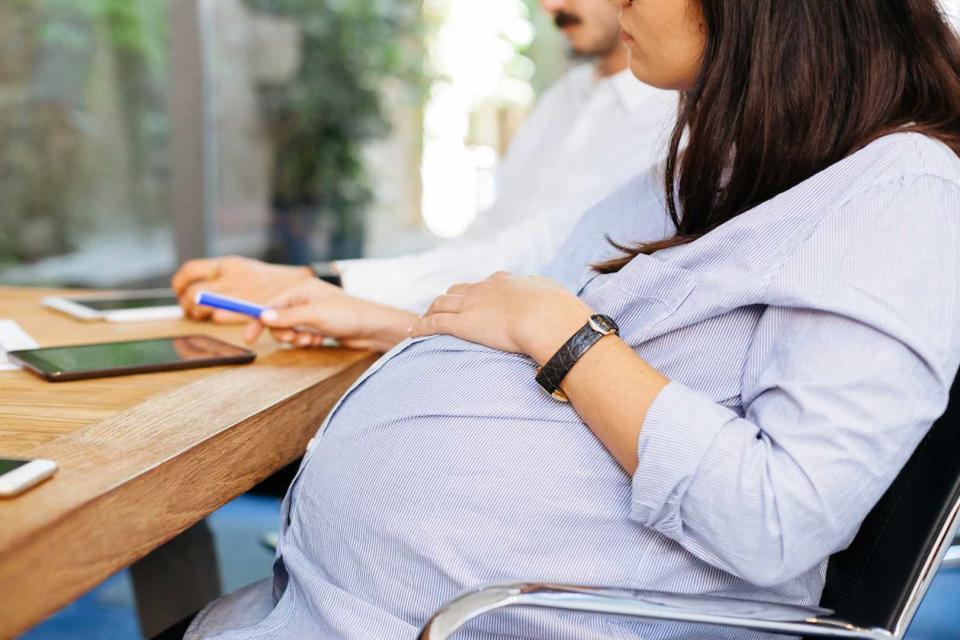Worried About Your Water Breaking? Here's What to Know
It's normal to be a little freaked out about your water breaking in pregnancy, but we've got the information to set your mind at ease. Learn what causes your water to break, what it feels like, and whether it means labor is on the horizon.

In the last few weeks of pregnancy, it's normal to worry about "worst case scenarios" involving their water breaking. They imagine an uncontrollable gush that happens in a crowded elevator, for example, or while waiting in line at the grocery store. But did you know that only 15 to 20% of pregnant people experience their water breaking before labor starts? And it's just as likely to be a small trickle as the stereotypical flow of liquid, says Ashley Brichter, founder and CEO of Birth Smarter, which offers in-person and virtual childbirth classes for expectant parents.
To clear common misconceptions, we've broken down everything you need to know about your water breaking, which is also called rupture of the membranes. Keep reading to learn how your water breaks, what it looks and feels like, and when to head to the hospital.
Related:
What causes your water to break?
While gestating in your uterus, your baby is cushioned and protected by a bag full of amniotic fluid. When that bag ruptures (aka "water breaking"), a burst of this clear fluid flows out of your cervix and vagina, followed by continuous leaking.
Does it mean the baby is on the way?
Short answer: Yes, but you may not need to reach for your hospital bag just yet. Labor could still be a day or two away, says Allison Hill, M.D., co-author of The Mommy Docs' Ultimate Guide to Pregnancy and Birth. In an overwhelming majority of cases—some 80%—labor begins with contractions, then water breaking. In the other 20%, the water breaks first and is usually followed by labor pains within a few hours.
Related:9 Signs That Labor Is Approaching
What does it feel like when your water breaks?
The sensation is different for everyone. For some, it's a slow trickle or a discharge feeling (you may think you've suddenly become incontinent!). For others, it's that Hollywood-style gush, like you just completely peed your pants. Still others hear a pop and feel pressure, then relief, once the bag breaks.
What does water breaking look like?
Though urine and discharge exit your body from the same general neighborhood, amniotic fluid is typically odorless, though some pregnant people say it smells sweet, like chlorine or semen. It's also usually clear or tinged with small streaks of blood.
Related:Vaginal Discharge During Pregnancy
How much fluid will come out of me?
This is the million-dollar question (and probably the one keeping you up at night!). How much comes out at first can vary from a small leak to an all-out gush, depending on whether you have a tear or a gross rupture, explains Yvonne Bohn, M.D., co-author of The Mommy Docs' Ultimate Guide to Pregnancy and Birth. Once it starts flowing, the amniotic fluid will continue leaking until all 600-800 milliliters (or roughly 2 1/2-3 cups) of it empties out. In the meantime, you can wear a sanitary pad to protect your clothes or lay a clean towel underneath you to protect your seat.
What should I do—and not do—when my water breaks?
A call to your OB-GYN is in order — they can advise you on when and how quickly to come to the hospital. Among the factors they will consider are:
How far along you are. If the bag breaks before 37 weeks, it's considered premature rupture of the membranes (PPROM). Depending on how early this happens, your OB-GYN may try to delay labor to give your baby more time to mature.
Related:What Does Labor Feel Like?
Your contractions. It's true that first-time parents often take longer to deliver. But if regular contractions aren't happening within 24 hours of your pregnancy water break, your OB-GYN may want to evaluate you and baby, and possibly induce labor with Pitocin.
How long it's been since the bag broke. If your baby hasn't arrived within 24 hours after your water broke, your doctor may give you antibiotics intravenously. That's because there's a chance an infection can travel into the uterus and cause an infection in the baby, says Dr. Hill.
As for what to avoid after your water breaks in pregnancy, it may depend on your doctor. "I allow women to get in a bath, but I know others who don't recommend it," Dr. Hill says. "I also recommend they not have intercourse, because that could introduce bacteria into the uterus."
Related:Should You Try Breaking Your Own Water?
When should I be concerned?
Contact your OB-GYN if your water breaks. If you're less than 37 weeks pregnant, or if you're GBS Group B Streptococcus positive, they may send you to the hospital. Also pay attention to the condition of the amniotic fluid. If it's foul smelling, stained with lots of blood, or has a greenish or dark tint, head straight to hospital. Those are all signs that your baby could be in distress.
Finally, take note of whether contractions have begun. If more than 24 hours have passed since your water broke and you're still not feeling them, let your doctor know.

